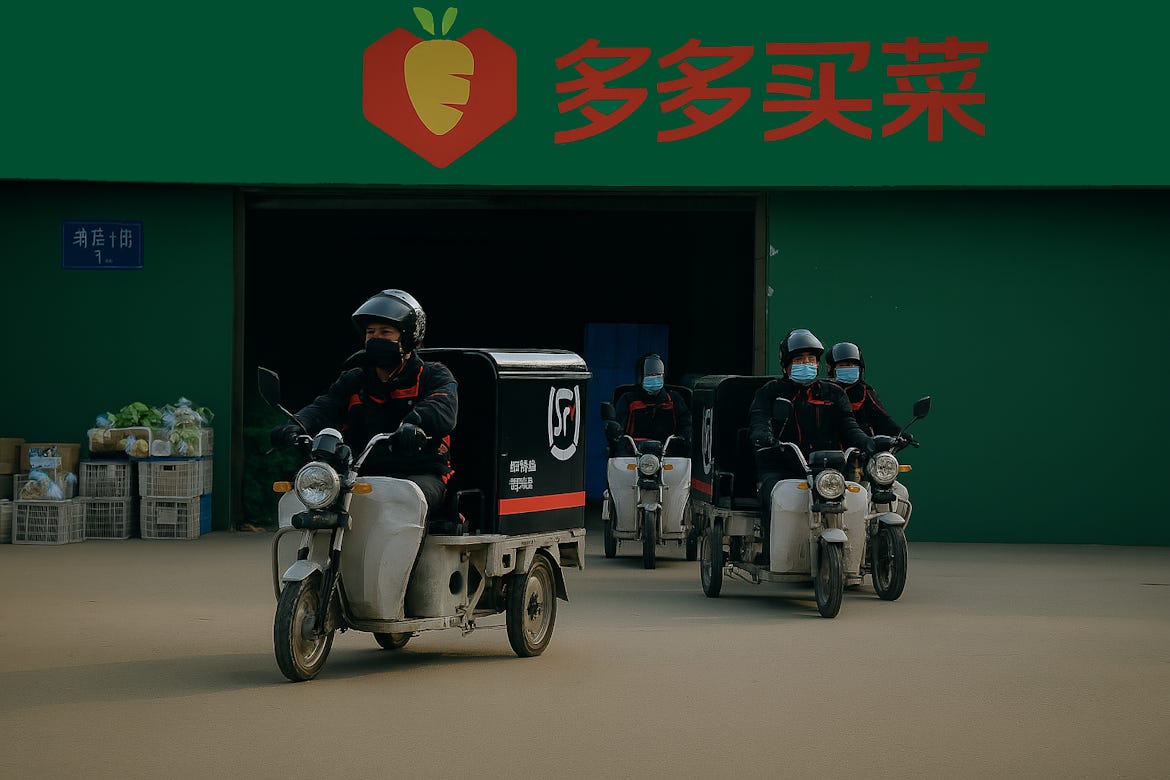Pinduoduo enters the instant retail market
After defeating Meituan in one battle, is Pinduoduo starting another one?
Image by Copilot.
Contents
Free section
Paid section
Things that caught our attention
Robots, Investment, and Techno-Optimism: Rui Ma on China’s Distinct AI Ecosystem. An interview on The Perspectives with Wenchi Yu.
Rui on the Tech Buzz China visit to BIGAI and Kepler Robotics.
Rui on why China is racing to automate.
Introduction
A few months ago, rumour had it that Pinduoduo’s grocery delivery platform, Duoduo Maicai, was building warehouses in Shanghai and was expected to launch an instant retail business in August. It would select unbranded products from Duoduo Maicai and the Pinduoduo app to ensure low prices and cooperate with third-party couriers. Pinduoduo seemed worried that after winning the CGB market, it could be hurt by the rise of Meituan’s Instashopping (Meituan Shangou) and Xiaoxiang divisions.
With all the attention on the battle between JD, Taobao/Ele.me and Meituan last summer, this news has largely remained under the radar. Tech Buzz China decided to do some digging and uncovered interesting facts about what might become Pinduoduo’s new priority business after the main app, Duoduo Maicai and Temu.
The free section of the report below outlines Pinduoduo’s current plans and the reasons behind its entry into the instant retail market. Paid subscribers get full access to this report and will learn about the operational details, challenges and outlook for Pinduoduo’s instant retail business.
Become a paying subscriber to unlock the full report and support our in-depth research into key China tech trends.
Ed Sander, Tech Research Analyst
Pinduoduo won the community group buying market, but …
A few years ago, the big internet companies entered the community group buying (CGB) sector and pushed out the small start-ups. In this business model (mostly) groceries are delivered at a pick-up point in a community the next day, giving consumers lower prices and platforms lower logistical costs.
When the dust settled after years of fighting, Pinduoduo’s Duoduo Maicai came out as market leader and Meituan’s Youxuan as #2. However, Duoduo Maicai experienced a significant decline in the first half of 2025, particularly before May. This was primarily due to the company’s shift in focus to cross-border e-commerce (Temu), which resulted in insufficient attention to the fresh food business. Furthermore, the group decided to discontinue financial support for the fresh food delivery business, requiring it to become self-sufficient. Limited funding constrained product updates and marketing efforts, leading to reduced advertising spending. Operationally, it faced numerous challenges, including finding high-quality suppliers and delivery providers, as well as employee turnover. Declining delivery service quality further exacerbated its performance. However, the situation began to improve in June due to competitors' exits.
Meituan, which lost billions of yuan last year, has decided to close Youxuan in all loss-making provinces, leaving only Zhejiang and Guangdong (down from 20 provinces and 2,000 counties and cities). Meituan overestimated the growth potential and underestimated the difficulty and costs of transforming retail. CGB has low average order values, low margins and a limited market size.
Meituan will invest in its self-operated front-end warehouse business, Xiaoxang (formerly Meituan Maicai), instead, thereby strengthening its position in the instant retail market. It has been expanding into new regions and has opened hundreds of front-end warehouses, gradually surpassing competitors Dingdong and Pupu. It’s now active in 21 cities and aims to expand into 30-40 first- and second-tier cities. Meanwhile, the Meituan Youxuan staff has essentially been reassigned to Meituan’s new community discount supermarket brand, Happy Monkey (快乐猴, Kuaile Hou).
In 2024, Duoduo Maicai’s total transaction volume exceeded RMB 20 billion, but its recent performance has been disappointing, with negative growth in both 2024 and the first half of 2025. However, following Meituan Youxuan's exit, it experienced its first significant growth in July 2025, with GMV increasing by a staggering 340% year-over-year and 30% month-over-month. Duoduo Maicai is picking the bones of Meituan Youxuan’s business and snatching up the former Meituan Youxuan merchants and market share. However, this growth may be temporary, as its current core customer base—households with monthly incomes of approximately RMB 10,000—does not fully match Duoduo Maicai’s product offerings. More importantly, Duoduo Maicai currently lacks effective customer acquisition methods, and its existing product offerings do not fully meet market demand. These factors may affect the long-term sustainability of this growth.
Overall, Duoduo Maicai is not yet profitable, primarily due to its entry into the Hong Kong market and the investments required to transition from a pickup model to a delivery model. Still, it’s optimistic about future profitability. As the sole supplier, it holds a more advantageous position in procurement negotiations.
A Changing Market
Duoduo Maicai might have won the war with Meituan. Still, the CGB market had been in decline due to the growing popularity of other e-commerce models, such as instant retail (quick commerce). Instant retail platforms offer delivery within an hour, rather than the next-day service level of CGB. Furthermore, in the new instant retail battlefield, prices are often subsidised, limiting CGB's price advantage.
When Meituan Youxuan pulled out, Duoduo Maicai’s average daily order volume increased from 36-37 million in May to over 44 million, but this still represented a year-on-year decrease of 5%-7%. In July, average daily order volume further increased to 46-47 million, with the average price per item reaching a record high of RMB 13.8. But despite these improvements, Meituan Youxuan’s customers have not entirely shifted to Duoduo Maicai. Historically, Duoduo Maicai’s peak daily order volume reached over 50 million units; last summer, it was less than 20% below that peak.
In the future, the e-commerce industry is expected to transition from a traditional model to a comprehensive service model, with instant retail and fast delivery becoming key drivers of growth. The potential of the instant retail market is generally believed to exceed the current pace of domestic integrated e-commerce, particularly in the delivery sector, making it a promising blue-ocean market worthy of close attention.
Duoduo Maicai recognises that it must adapt its business model to remain viable. In 2024, it experimented with adding local services, but this effort ultimately failed. It also attempted to turn grid warehouses into instant retail front-end warehouses. Still, the average delivery time was too long (four hours, compared to the market standard of one hour).
Workers at a Duoduo Maicai warehouse. Image source: Sohu, 2022.
Pinduoduo’s instant retail plans
Competition in the instant delivery market is fierce in first- and second-tier cities, and without innovation, Pinduoduo’s fresh food business could face growth bottlenecks. To address this challenge, Duoduo Maicai is experimenting with a new instant retail business model, similar to its previous community pickup point model. If this instant retail model is successful, it may be operated independently. PDD plans to establish a local lifestyle business group that integrates multiple consumer-related businesses and potentially expands into other areas.
PDD planned to officially launch a fast-delivery retail service between August and September 2025, following a testing phase. This is considered a significant project, with an initial investment estimated at RMB 10 billion, primarily for building a delivery network and warehousing facilities.
In recent months, the company has been establishing the necessary infrastructure and forming partnerships with courier companies. Initially, it will leverage Duoduo Maicai’s front-end warehouses and community courier collection service ‘Duoduo Station’ (多多驿站, Duoduo Yizhan) network.
The instant retail service will combine multiple delivery models, including half-day and hourly delivery, along with an extensive network of front-end warehouses. The company is considering three key directions for instant retail: whether to enter the food delivery market, establish its own delivery team, and focus on specific categories or expand across all categories.
In terms of market coverage, instant retail will gradually expand from first- and second-tier cities to third- to fifth-tier cities; however, initial coverage will be limited.
Why is Pinduoduo entering the instant retail market?
Pinduoduo’s primary reason for considering entering the instant retail market is suboptimal logistics efficiency. Despite establishing a strategic partnership with Jitu Express, its performance in the domestic market still lags behind SF Express, YTO Express, and JD Logistics. Notably, Jitu Express has performed well in Southeast Asia and Latin America; however, its business in China still requires improvement.
JD Logistics excels in rapid delivery and continually expands its fleet of delivery drivers. In the future, China’s e-commerce industry is expected to diversify, encompassing traditional e-commerce, instant retail, and fast delivery services. Therefore, Pinduoduo’s top priority in entering the instant retail market is improving logistics efficiency. Pinduoduo hopes to address delivery timeliness issues through instant retail.
Pinduoduo has encountered some difficulties in overall growth and plans to use instant retail to offset its logistics shortcomings and increase delivery revenue. While its logistics capabilities are relatively limited, Taobao and JD.com offer relatively high-quality logistics services. Therefore, Pinduoduo is primarily focused on expanding into new markets.
While the initial investment in instant retail may reach tens of billions of yuan and result in short-term losses, its long-term growth prospects remain positive. Pinduoduo’s management believes that the primary purpose of developing instant retail is to open new markets rather than compete with traditional e-commerce.
This instant retail service caters to the needs of modern consumers, particularly those born after 2000. The core of instant retail is rapid delivery, which requires goods to reach customers within the agreed-upon timeframe. Traditional e-commerce platforms primarily sell products with low consumption frequency, such as computers and home appliances. Long lifespans characterise these low-frequency products. For example, a PC is typically used for three to five years, while a television may last up to ten years. This makes it difficult to attract consumers to the platform frequently. Therefore, platforms need to attract more users by offering high-frequency products, thereby driving new customer acquisition.
Instant retail, similar to food delivery and ride-hailing services, is a high-frequency consumption sector with broad market prospects. The appeal of this model lies in its ability to generate large amounts of user traffic through frequent transactions, making it theoretically feasible. It not only meets the needs of modern consumers but also creates more business opportunities and user retention for the platform.
Pinduoduo’s management views instant retail as a core strategy, aiming to develop a new primary growth driver rather than supplement existing businesses. This emerging sector has significant potential, with a projected compound annual growth rate of 30-50%. However, losses are expected in the early stages of instant retail. Profitability is closely linked to order volume; higher order volume results in lower costs per delivery. Notably, before achieving 20% market share, insufficient order density will negatively affect bargaining power with logistics partners, leading to higher costs.




